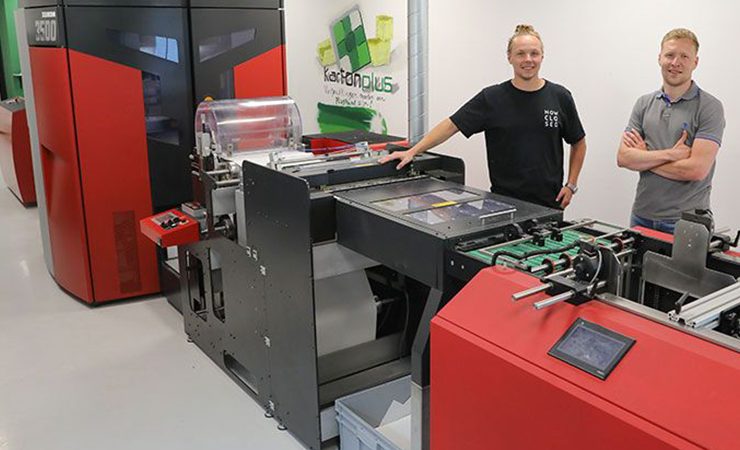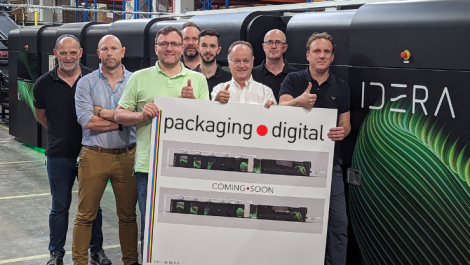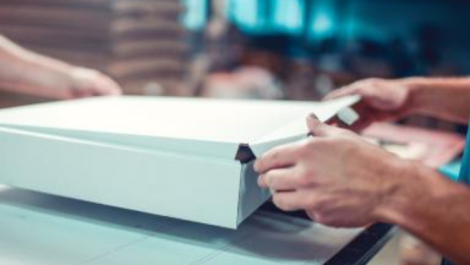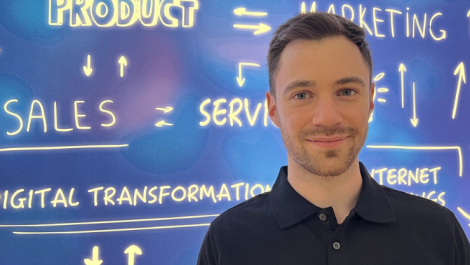Dutch label printer Labelplus has successfully diversified into folding cartons, with the activities of its Kartonplus subsidiary powered by Xeikon’s toner digital printing technology.
Labelplus was experiencing rising demand for folding cartons, leading to the decision create a dedicated subsidiary for this activity. The new company, Kartonplus, was established by brothers Tom and Bas Lempsink and has been fully operational since March 2021. Both Kartonplus and Labelplus are located in Enschede, the Netherlands.
To start its journey into digitally produced folding cartons, Kartonplus acquired a Xeikon 3500REX and a Tresu coater.
Kartonplus consciously chose digital printing and a Xeikon digital press as sister company Labelplus has had a relationship with Xeikon since 2008. Labelplus currently runs two Xeikon label presses –3300 and CX3 models –, alongside eight offset presses.
Xeikon’s REX range is the company’s offer of remanufactured presses, introduced last year to allow smaller companies greater access to professional digital printing systems at a more affordable price point.
Bas Lempsink commented, ‘You don’t have any delays and the customer can order exactly the quantity required at that moment, without having to keep inventory himself.’
Tom Lempsink added, ‘When a customer is forced to order more than he actually needs at the moment, it remains to be seen whether he will be able use that stock in full. So by ordering just what he needs, with a fast delivery time, the customer can remove the cost of inventory risk.’
The Xeikon 3500REX is running full speed at Kartonplus. Job run lengths vary whilst the type of cartons that Kartonplus can produce – auto-lock bottom with flap closure, flap closure bottom with lid, Euro pendant with flap closure, and others – is diverse. Board weights of 220g, 260g, 280g and 300g are offered, with a special frozen product weight of 305g (510mμ) available. Extensive warehousing space means Kartonplus can keep boards on stock, enabling a fast response to almost any customer need.
Whilst digital printing in larger print runs is often slightly more expensive, Tom Lempsink said, ‘It is much more expensive if you eventually have to throw away 50,000 of the 100,000 boxes ordered because as a brand you sometimes want to switch designs. Or you have had to store boxes for so long that they no longer meet your quality standard. Or there are regulatory changes that require new language on the boxes. We find that medium-sized print runs also suit us perfectly, and we are becoming increasingly interesting for our customers in terms of price, especially when they consider the total lifecycle cost of an order.’
Kartonplus has also made a number of sustainable choices in its manufacturing operation, such as the use of a water-based dispersion varnish. Customers can also opt for matte or gloss coating on the five-colour printed matter. In addition to CMYK, white, black or any other spot colour can be added.
The Kartonplus machine fleet further includes a Koenig & Bauer folding gluing machine – the first in the Netherlands – and a Bograma rotary die-cutting machine. On an Echo digital die-cutting machine, a sample box printed on the Xeikon press can easily be creased and die-cut in quantities as small as one.
Bas Lempsink noted, ‘We are especially getting business from small to mid-sized companies and small e-commerce companies, but also from very large companies that are looking for a limited edition of boxes that can be printed and produced quickly. If a food manufacturer has 5000 products left over that it cannot package due to a lack of boxes, they can order those boxes in that quantity from us. That way they don’t have to throw away any products.’






